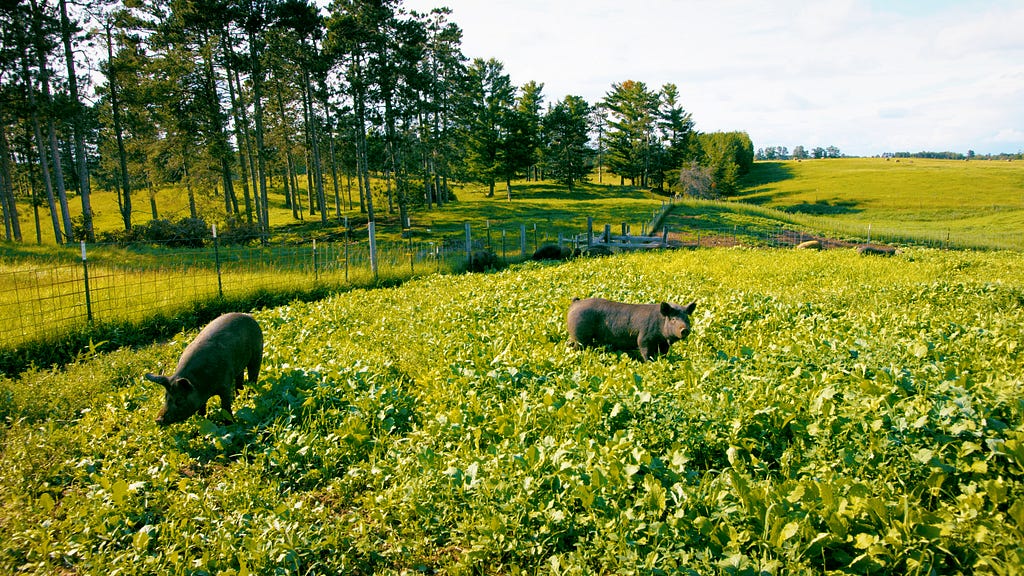Best For The World B Corp Iroquois Valley Offers Public Investment Opportunity to Support Organic Farmers
By Claire Mesesan, communications director at Iroquois Valley Farmland REIT
It’s 2019 and only 1% of U.S. farmland is farmed organically. And yet, by most accounts, organic is growing. The market is as big as it’s ever been, consumer awareness is increasing, and organic practices are increasingly being uplifted in policy conversations. In spite of this momentum, there are still many barriers for farmers looking to shift their systems to organic. What do farmers need to make the change?
Iroquois Valley is a Best For The World Certified B Corporation committed to helping young farmers overcome what the National Young Farmers Coalition has suggested is their top challenge today: long-term access to land. Iroquois Valley provides organic farmers secure farmland tenure through leases and mortgages and most recently has begun to support the growth of farm businesses through operating lines of credit.
Our investment theory is that land security enables land stewardship — we believe that farmers will thrive when they’re backed by long-term capital that shares risk.
The company raises capital from mission-aligned investors who understand that agriculture is key to solving the climate crisis, improving public health, and revitalizing rural communities.
In our experience, there’s no shortage of farmers who want to farm organically and regeneratively. The challenge lies in accessing the resources needed for farm viability: land access, capital, and markets. Farmers need systemic support in order to change agriculture and build the regenerative food and farming system we know can exist.
A New Lease on Organic
Iroquois Valley was founded in 2007 to provide long-term leases to organic farmers and offer investors the opportunity to invest in a real asset with a triple-bottom-line return. The leasing model solved a problem faced by organic farmers who often rent land on a year-to-year basis and lack the land security required to invest in a three-year transition to organic.
The Iroquois Valley lease structure allows farmers to pay lower rates during the organic transition in order to get through the most financially challenging time. Post-transition, farmer lease rates go up as the farms create more revenue, and after seven years the farmer has the opportunity to purchase the property from Iroquois Valley.

When the company introduced mortgages in addition to leases in 2016, it was inundated by calls from farmers with stories about their inability to get financing as organic farmers because organic farming was considered too risky of a business. In order to grow the organic acreage in this country, we need banks and companies like ours willing to finance the transition.
Fortunately, investors in Iroquois Valley understand that we have to take risks alongside our organic farmers if we hope to improve our soils, produce nutritious food, and limit the negative environmental impacts of conventional farming.
This model embodies the idea of “business as a force for good” by producing food in ways that build soil organic matter and climate resilience.
Investing in Regenerative Farming
Our farmers think about their farms holistically — they’re using solar energy to power their farms, they’re using conservation programs to restore native ecosystems, they advocate for policies to strengthen organic standards and resources, and they are constantly adapting and improving their operations. Agriculture is an inherently risky business but an essential one — and the U.N.’s recently released report on land use reinforces that we need organic and regenerative farmers on the land.
To accelerate investment in this space, Iroquois Valley recently opened a Direct Public Offering to scale its support for organic farmers by building a broader base of investors. The minimum for this offering is just over $10,000 to target the retail investor.
Operating as a B Corp and public benefit corporation has influenced Iroquois Valley’s choice to make its investments more accessible — after all, this is a community focused on building an inclusive and regenerative economy. We are encouraged to see momentum about this movement, especially in the B Corp ecosystem, and are looking forward to digging in on solutions together.
B the Change gathers and shares the voices from within the movement of people using business as a force for good and the community of Certified B Corporations. The opinions expressed do not necessarily reflect those of the nonprofit B Lab.

If We Want to Change Our Food System, We Need to Change Our Finance System was originally published in B the Change on Medium, where people are continuing the conversation by highlighting and responding to this story.